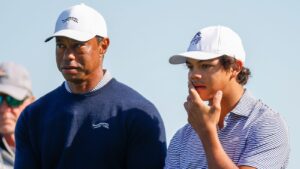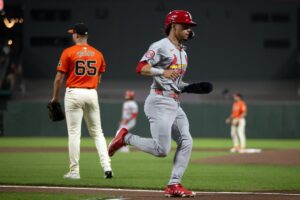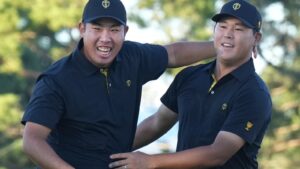Technically, this is an award for two people: Rassie Erasmus, the Springboks’ director of rugby, and Jacques Nienaber, the Springboks‘ head coach.
During their six years at the Boks, the two became almost one. That unprecedented working relationship – a two-man politburo of ideas and innovation – delivered the Rugby World Cup 2023 as promised.
Three one-point victories in the knockout stages, 29-28 over France, 16-15 over England, and 12-11 over the All Blacks in the final, exemplified the Boks’ never-say-die attitude and calm under pressure. That took six years to perfect and was completed in 2023.
RasNaber’s goal since returning to South Africa and being appointed as Springboks coaches in 2018 has been to win the RWC in 2023.
Nienaber began his coaching career as an assistant coach specializing in defense. Erasmus served as both director of rugby and head coach, though he never held the position of head coach between 2018 and 2019, when the pair won their first RWC title.
Nienaber was promoted to head coach in 2020, but little has changed. He will continue to defend until the World Cup final on October 28, 2023. There were some fundamental changes, such as Nienaber being required to be in the coaches’ box on game day and being thrust into more media and public relations duties. The day-to-day nuts and bolts of cultivating a high-performance environment, however, remained largely unchanged. RasNaber was in charge – two heads are better than one – and the set-up included a cast of high-quality characters.
Back in 2018, after two of the worst seasons in Springbok history, the Boks stated their goal was to win the RWC in 2023.
Then they won the RWC 2019, and we all wondered, “What now?” Nothing, in fact. The goal was still to win the RWC in 2023. The only difference this time was that the stakes were higher.
The Boks were no longer considered outsiders. They had a target on their back, so they had to reset some of their own. After the success of 2019, they suddenly had the opportunity to win back-to-back titles and become the first country to win four World Cups.
It revitalized the mission, allowing RasNaber to set new goals and find new ways to motivate a stable group of players. All of the planning, tinkering, and building culminated this year.
They had a list of 13 criteria that defined what they wanted from players and what traits players needed to have early on. Character was the most important factor on that list. The character who never stops working, who prioritizes the team, who strives to go further and be better.




